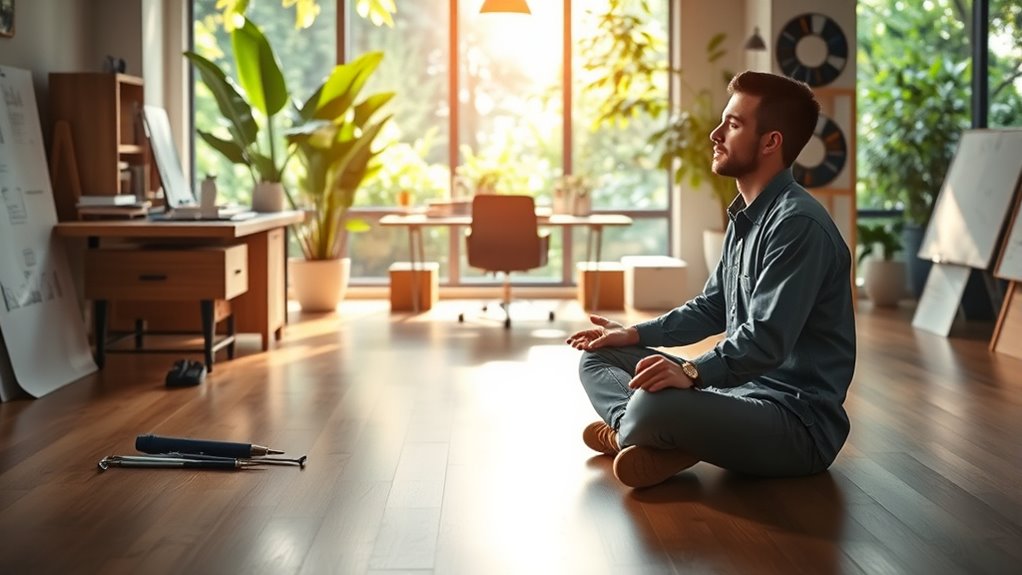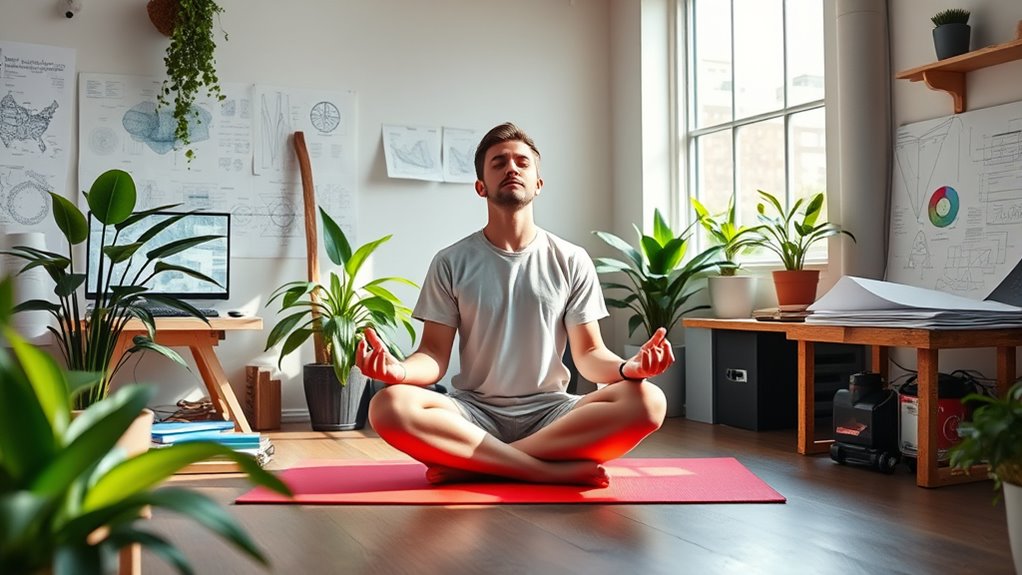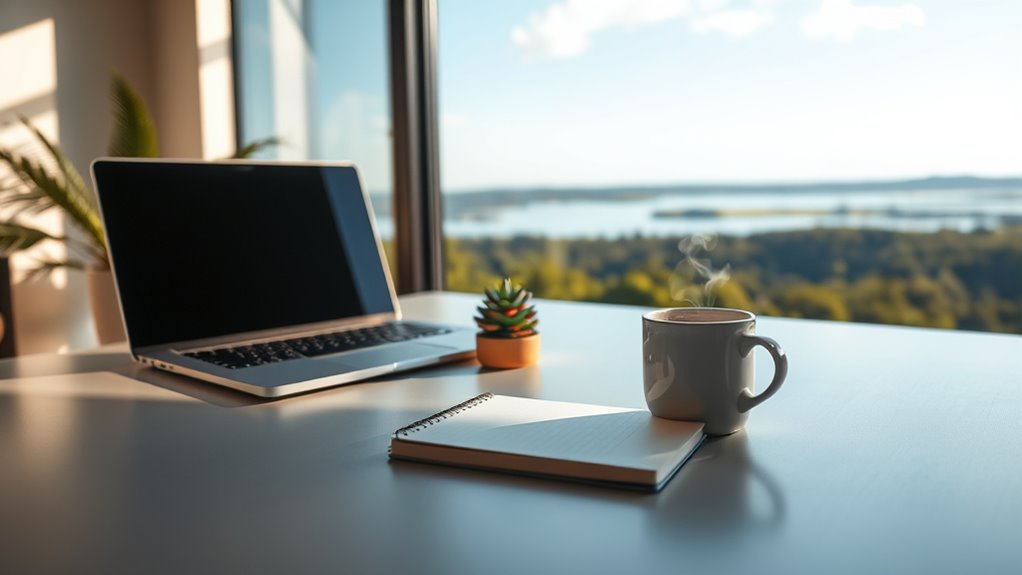As an engineer, embracing mindfulness can significantly enhance your performance and well-being. It helps reduce stress, improves emotional regulation, and fosters creativity, making you more resilient in high-pressure situations. Techniques like focused breathing and brief mindfulness interventions can sharpen your concentration and decision-making skills. Plus, when implemented in the workplace, mindfulness can create a supportive environment. Stick around to discover more about integrating mindfulness into your engineering journey for even greater benefits.
Key Takeaways
- Mindfulness practices reduce stress and enhance emotional regulation, improving decision-making in engineering contexts.
- Techniques such as focused breathing and brief interventions can boost concentration during high-pressure tasks.
- Engaging in creative visualization fosters innovation and helps engineers think divergently.
- Implementing mindfulness programs in workplaces promotes emotional intelligence and resilience among engineering teams.
- Integrating mindfulness in education prepares future engineers for adaptability and lifelong learning in their careers.
Benefits of Mindfulness in Engineering

When you embrace mindfulness in engineering, you unlock a range of benefits that can significantly enhance your work experience.
Mindfulness helps reduce stress levels, promoting relaxation and calmness, which is crucial when tackling complex projects. By increasing your awareness of stress, you’ll manage it more effectively.
Improved emotional regulation allows you to pause before reacting to stressors, leading to better decision-making. Regular practice builds resilience, enabling you to cope with high-pressure situations.
You’ll also find that mindfulness contributes to a more positive overall experience at work, even if stress levels remain unchanged.
Mindfulness Techniques for Enhanced Performance

Five effective mindfulness techniques can significantly enhance your performance as an engineer.
First, practice focused breathing to improve concentration and keep distractions at bay.
Next, try brief mindfulness interventions during stressful design tasks; these can lower your perceived stress and boost your performance.
Incorporating short mindfulness practices during high-pressure design tasks can reduce stress and enhance your overall performance.
Third, engage in creative visualization to foster innovation and encourage divergent thinking.
Additionally, develop your emotional intelligence by observing your emotions, which helps you navigate stress and collaborate better with your team.
Finally, embrace a problem-solving mindset; mindfulness strengthens your ability to generate innovative solutions for complex challenges.
Physical and Emotional Advantages of Mindfulness

Mindfulness offers a wealth of physical and emotional benefits that can transform your well-being as an engineer. Practicing mindfulness reduces stress-related symptoms, such as tension headaches and heart problems, while improving your overall physical health.
It enhances cardiovascular health by lowering blood pressure and encouraging healthy behaviors. Emotionally, mindfulness helps regulate emotions, decreasing depressive symptoms and negative feelings. You’ll gain better emotional intelligence, allowing for more effective responses to stressors.
Additionally, mindfulness boosts self-compassion and improves your concentration and mental clarity, making problem-solving easier. By incorporating mindfulness into your routine, you not only enhance your physical vitality but also cultivate a more positive and resilient emotional landscape.
Implementing Mindfulness in Engineering Workplaces

As engineers face increasing demands and complex challenges, implementing mindfulness in the workplace can significantly enhance both individual well-being and team dynamics.
Companies like Google have shown the benefits of mindfulness programs that boost emotional intelligence and reduce stress.
Mindfulness programs, as demonstrated by companies like Google, enhance emotional intelligence and alleviate stress in the workplace.
Consider creating meditation rooms or organizing yoga classes to foster a supportive environment. Encourage regular breaks to help you manage stress and maintain productivity.
Allocating time for innovation can spark creativity and mindfulness. You can also utilize tools like guided meditation apps or participate in free meditation sessions. Additionally, integrating personalized learning practices can further promote employee engagement and adaptability within engineering teams.
Mindfulness in Engineering Education and Professional Development

Recognizing the growing pressures in engineering education, integrating mindfulness practices can be a game-changer for students.
These techniques, like meditation and breathing exercises, can significantly reduce stress and anxiety, enhancing your overall well-being. With improved focus and cognitive performance, you’ll find tackling complex engineering tasks easier.
Mindfulness also helps you manage emotions, boosting your emotional intelligence and resilience, crucial for navigating academic challenges. Group mindfulness sessions create a supportive environment, making it easier to adopt these practices.
By incorporating mindfulness into your education, you not only enhance your academic success but also prepare for a career that values adaptability and lifelong learning.
Embracing mindfulness now can lead to a more fulfilling, balanced engineering journey.
Frequently Asked Questions
How Long Should I Practice Mindfulness Daily for Effectiveness?
To effectively practice mindfulness, aim for about 10 to 12 minutes daily.
Short sessions can significantly enhance your wellbeing and reduce stress.
It’s more beneficial to practice consistently, even if you’re only dedicating a few minutes each day, than to have infrequent longer sessions.
Regular practice helps you build awareness and focus over time.
Can Mindfulness Improve My Technical Skills as an Engineer?
Yes, mindfulness can definitely improve your technical skills.
By enhancing your focus and cognitive flexibility, it helps you tackle complex problems more effectively. You’ll find that regular practice fosters creativity, enabling you to generate innovative solutions.
Mindfulness also reduces stress, leading to a clearer mindset, which is crucial for technical tasks. As you become more emotionally aware, your teamwork and communication skills improve, further enhancing your overall technical abilities.
What Are Common Misconceptions About Mindfulness for Engineers?
Common misconceptions about mindfulness include the idea that it requires extensive time commitments or special equipment.
You don’t need to be calm to practice it, nor do you need to join a group; you can practice alone.
While some expect immediate results, consistent practice brings more significant benefits.
Many also think mindfulness eliminates stress, but it actually helps you manage it better, enhancing your overall awareness and acceptance in daily life.
Are There Specific Mindfulness Apps Recommended for Engineers?
Imagine you’re a car racing down a track, but distractions keep pulling your focus.
Mindfulness apps like Headspace and Calm can be your pit stop, helping you refuel and regain your concentration. These apps offer guided meditations and personalized content to suit your needs.
By incorporating mindfulness into your routine, you can enhance your focus, creativity, and problem-solving skills.
How Can I Encourage My Team to Practice Mindfulness Together?
To encourage your team to practice mindfulness together, start by organizing guided sessions during work hours, making it a shared experience.
Introduce mindfulness apps like Headspace or Calm for individual practice.
Incorporate mindfulness into team-building activities, and invite coaches for tailored workshops.
Create a supportive environment where feedback is welcomed, and encourage regular practice as part of your team’s routine.
Conclusion
Incorporating mindfulness into your engineering practice isn’t just a trend; it’s a transformative tool that sharpens your focus and enhances your creativity. As you embrace these techniques, you’ll find that the pressures of deadlines and complex problems become more manageable. Think of mindfulness as your secret weapon, turning stress into clarity. By prioritizing this practice, you’re not just improving your work—you’re investing in a healthier, more balanced professional life. So, why not start today?









